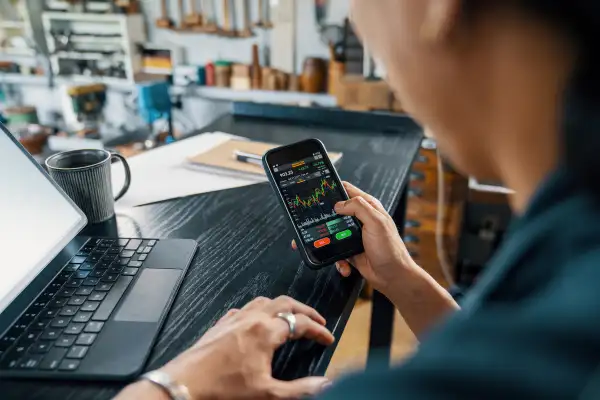What Is Forex Trading and How Does It Work?
Money is not a client of any investment adviser featured on this page. The information provided on this page is for educational purposes only and is not intended as investment advice. Money does not offer advisory services.

The investment world is full of opportunities, and the stock and bond markets get most of the attention. But another market that significantly overshadows them when it comes to volume is the foreign exchange market, which trades trillions of dollars worldwide every day.
Forex trading, the common name for the foreign exchange market, entails trading currencies instead of securities (think the U.S. dollar, European euro or Japanese yen).
Although many entities trading foreign currencies via the forex market are banks, governments and high-volume brokers, there’s space at the table for individual investors as well. But, as with most investing opportunities, there’s also risk. Read on to find out more about the pros and cons of forex trading.
Table of contents
- What is Forex Trading?
- How does Forex Trading work?
- What is the Forex Market?
- How to Start Forex Trading
- What are the Best Forex Trading Brokers?
- What are the Most Common Forex Terms?
- Forex Trading FAQs
What is Forex Trading?
Foreign exchange trading, or forex trading, is the buying and selling of foreign currencies to make a profit.
Trading forex requires the trader to anticipate the strength of foreign currencies when pitted against one another, using preset currency pairs like the euro and the U.S. dollar. The goal is to buy currencies at lower prices and sell them at higher prices to earn a profit.
The forex exchange operates 24 hours per day, five and a half days per week. The trading day starts in Australia, then moves to Europe and ends in North America, with markets overlapping during the day.
The market is highly volatile and can be affected by everything from consumer confidence to inflation to geopolitical events.
Pros and Cons of Forex Trading
- Offers a global marketplace
- Low cost of entry
- Potential for fast returns
- Many platforms offer free training
- High volatility
- High risk of fraud
- Steep learning curve
Pros explained
Offers a global marketplace
Investors are not limited to trading in their own country’s currency, which provides plentiful options for trades.
Low cost of entry
While many of the movers and shakers buy millions of dollars worth of trades, it’s possible and even easy to get started with as little as $5, depending on the platform you choose. By using leverage, even small amounts of money can have a big impact (though, again, with risk).
Potential for fast returns
The forex market almost never sleeps; it’s open 24 hours, five and a half days a week around the world. Because most traders use leverage, there’s also the potential for big gains — and big losses.
Many platforms offer free training
Since the forex market is known to be volatile, many trading platforms offer free training and a practice account. With a practice account, potential traders can make trades, explore leverage and learn while investing imaginary money until they are confident enough to invest their cash.
Cons explained
High volatility
Compared to the stock market, there are even more factors that affect the forex market, like political movements, tourism, interest rates and more. Anticipating what will move the price is extremely difficult, making this a risky market to enter.
High risk of fraud
The forex market is particularly susceptible to fraud schemes. Most recently, the Commodity Futures Trading Commission (CFTC) warned of romance scams involving dating apps. Since all trading is done digitally, it’s easy to get duped into transferring funds to an unscrupulous trader using a fraudulent platform.
Steep learning curve
Trading on forex is very different from buying shares on the stock market. Although practice accounts are available, there’s still the potential for loss on any given day.
How does Forex Trading work?
While trading forex does have some similarities to the stock market, it also has some stipulations that complicate trading. For example, rather than just buying one currency and waiting for it to appreciate, forex traders have to choose currency pairs.
The most common currency pairs that include the U.S. dollar are EUR/USD (euro), USD/JPY (Japanese yen), GBP/USD (Great Britain Pound Sterling), USD/CHF (Swiss francs), AUD/USD (Australian dollar), USD/CAD (Canadian dollar), and NZD/USD (New Zealand dollar). However, there are at least 30 currency pairs traded every day.
Forex trading is speculative by nature. Once an investor has chosen a currency pair, they speculate on how much of one currency they can purchase using the other currency in the pair.
For example, if someone buys EUR/USD, they speculate that they may be able to buy more euros now at a lower price using USD than they could in the future. If the price of euros increases, the investor can make a profit. If the price goes down, the investor may lose money.
What is the Forex Market?
The forex market is different from the stock market in that it has no central, physical address like Wall Street. Instead, the forex market is a complex network of computers and brokers all over the globe. Within that network are three types of markets where foreign currency is traded daily.
Types of Forex Market
- Spot Market: The spot market is like a snapshot of currency prices. Currencies are traded at their value at that moment in time with no longer-term speculation. Spot trades can last minutes or even seconds and are typically conducted by large trading entities like banks and governments. Profits tend to be very small, but the volume makes it worth it for large traders.
- Forward Market: The forward market trades on the expectation of a future price change. A forward market contract is made between two parties, who both agree to transact at a mutually agreed upon date in the future. Forward market buys attempt to lower the risk inherent in forex trading.
- Futures Market: The futures market is similar to the forward market. But while the forward market contracts are typically bespoke contracts brokered between two parties, futures contracts are standardized based on the length of term and quantity of units and traded on the exchanges.
How to Start Forex Trading
Although large entities complete most forex trading, starting as an individual investor is fairly straightforward. Many broker sites allow investors to create a profile and fund an account, just like they would for fund or stock trading.
For those who want to try forex trading but want guidance, some sites offer advice and training. Some even provide the opportunity to practice trading without investing any money.
Forex trading is highly liquid and volatile, so investors should thoroughly research what they buy and the risks of trading before investing. Consider what affects the market and how long you want to keep your capital invested. Remember that on a 24-hour exchange, change can happen any time of day or night.
What are the Best Forex Trading Brokers?
There are as many forex brokers as there are stock trading apps. However, since forex is traded worldwide, you must verify that the brokerage you’re considering allows U.S. investors. Many do not.
Do research to determine which forex trading platforms make sense for you. If you're primarily interested in foreign exchange trading, Forex.com could be an option. Other popular online stock trading platforms, like TD Ameritrade and IG, also offer forex trading.
What are the Most Common Forex Terms?
Forex trading comes with its own terminology. Here are a few key terms to know.
- PIPs: PIPs stands for percentage in point or price interest point, and they are the smallest unit of measurement for forex trading.
- Leverage: Leverage allows retail traders to invest a small amount of money and use it to control a much larger amount. For example, 50:1 leverage is very common. That means that for every dollar you invest, you’ll be able to control $50. While this allows smaller investors to enter the arena, it also increases the stakes. Without leverage, you would have to deposit the entire amount you wished to hold. With it, you can invest much less and still trade a significant amount.
- Margins: Using leverage allows traders to earn greater profits, but they still must have the money to cover their investments. This collateral is called the margin. Margin rates vary based on which currency pairs are being traded.
Forex Trading FAQs
What is the difference between a forex broker and a forex platform?
Brokers are regulated by the National Futures Association (NFA) and the Commodity Futures Trading Commission (CFTC) and typically charge a fee based on a price per trade or a percentage of the profits.
Similar to investing platforms, forex platforms are software programs that allow investors to trade forex independently rather than relying on financial advisors. Platforms also charge fees for each trade but they may be less expensive than a broker's fees.
How do you avoid forex trading scams?
Is forex trading profitable?
How risky is investing in forex trading?
The second reason is that forex trading has become a hotbed of fraud schemes. Unscrupulous figures often offer highly attractive and sophisticated offers that can be difficult to vet. Investors should proceed with caution.
How much money do I need to start trading?
Your initial investment should be based on what type of trading you're interested in. Different strategies require different minimums to have a chance of returning a profit.
How can I open a forex trading account?
Many sites offer a training mode where beginners can try their hand at trading without using real money. Once you're comfortable with how your account works, you can start trading.
Summary of our guide to forex trading
- The foreign exchange market is a high-volume market for trading international currencies available all over the world. It's open 24 hours a day, five and a half days a week.
- Different currencies are paired up to determine which will gain value and which will lose value in order for traders to make a profit.
- While large players dominate, retail investors can make significant profits if they understand the system and do adequate research to buy and sell wisely.
- There’s a very low entry price to the market, and investors can utilize leverage to make each trade more impactful. This can increase profits when trades are good, but can also result in greater losses.
- There is a steep learning curve to forex trading, and the markets are very volatile. Given the risks involved, investors should proceed cautiously.

